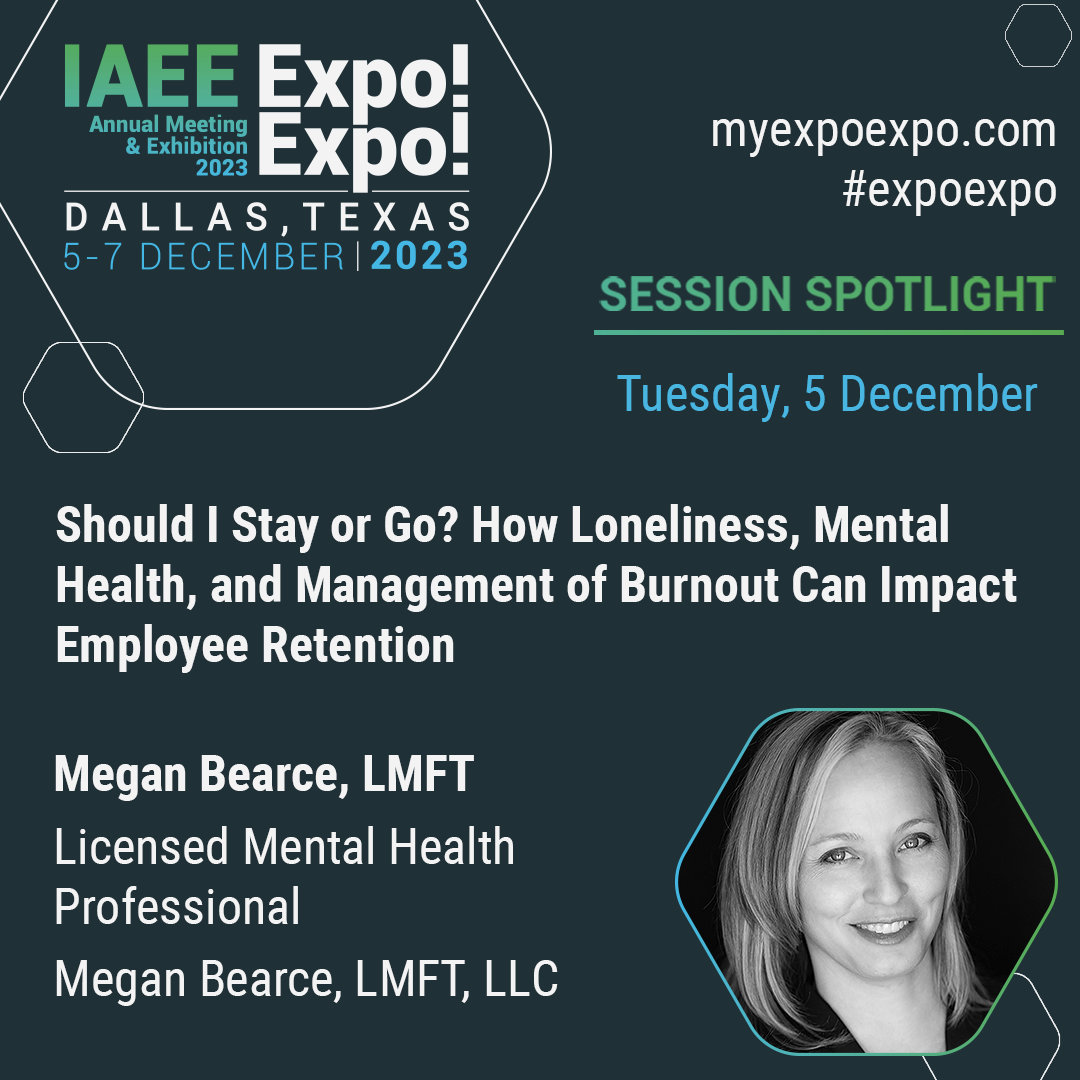By Mary Tucker, IAEE Senior Communications and Content Manager

Expo! Expo! IAEE’s Annual Meeting & Exhibition 2023 features a three-day educational journey covering seven diverse content tracks, including this enlightening session led by Megan Bearce, LMFT titled Should I Stay or Go? How Loneliness, Mental Health, and Management of Burnout Can Impact Employee Retention. The workforce has changed tremendously over the past few years and with burnout, loneliness and overwhelm on the rise, it has left some people questioning their job or entire career. Considering that, how does one decide what changes to make? How do managers promote workplace mental health to help cultivate a motivated team and foster employee retention?
Therapist and career coach Megan will share the latest findings on workplace wellness as well as the lesser-known stress responses of hyper-independence and high-functioning anxiety, to provide strategies for managing stress in all areas of one’s life. Using the analogy of a relationship, participants will engage in self-reflection activities that explore aspects of work dynamics such as communication, culture, self-agency, connection, leadership and expectations, as well as stressors outside of work, to identify challenges and opportunities for growth.
Megan will discuss her own career path that went from global accounting firm to Fortune 500 company to licensed mental health professional, speaker, and author, combined with patterns found in her work with clients. She will also share approaches for prioritizing workplace mental health, assessing one’s career goals, and increasing job satisfaction for managers and employees no matter what kind of change is next.
Here, Megan shares a preview of how participants will benefit from the information presented at Should I Stay or Go? How Loneliness, Mental Health, and Management of Burnout Can Impact Employee Retention.
In this session, you will describe the signs of hyper-independence and high-functioning anxiety, and how they can over time lead to burnout. What do people find most surprising about recognizing these symptoms before they become critical?
Megan: Some traits of hyper-independence are things like not asking for help or limiting connection with others because of lack of trust, or not delegating tasks. Over time all of these aspects can lead to overwhelm or burnout when responsibilities pile on. I have found that with clients who identify with these traits there is often a history of being labeled the good or easy kid, or the one that figured stuff out either because it was a rewarded dynamic or because there was chaos in their home that created the role. Often it’s a double-edged sword because it can propel one’s successes, but it’s often not sustainable.
High functioning anxiety is similar, but different. It’s often driven by a fear of failure or not wanting to disappoint others, and anxiety is all about fear of the unknown or feeling lack of control and some people will work harder and harder to keep all of the balls in the air until they find themselves burned out. When one is working in an environment where that is rewarded, it can be hard to slow down and take care of oneself. For others, work is great but other parts of their lives are where the challenge is.
You will also explain the five parts of well-being and how organization leaders can foster these as a strategy to increase employee retention. How does actively engaging team members in self-care benefit the organization?
Megan: It benefits everyone in many ways. First, the employees themselves ideally feel better, are more present mentally and physically at work, have stronger relationships with co-workers and all of that should lead to a productive team. But… the key is that self-care needs to be fostered, not just talked about. You can have the best onsite gym or EAP program, but if the staff is too busy to utilize those benefits or, for example, the blocked time they create for it is ignored by management, it loses its value. The five parts include things like finances and community, and so there are many opportunities for organizations to make meaningful change that can extend beyond the office walls.
In addition, you will help attendees identify work or personal goals, along with next steps for moving towards them that could lead to increased job satisfaction. Based on feedback you’ve received, what kind of timeline can participants expect to see results once they start applying the strategies they will learn?
Megan: I wish I had a crystal ball to make that sort of prediction! Every person in the room will have a different goal and timeline and tolerance for change. My goal for them is to get more clear on what they want, what is working, and what they’d like to change. That also includes thinking about who is on their team. Who can they share these goals with and help move them towards them faster?
Going back to your first question, this can be hard for people who are worried about the unknown, or fear letting others down, or have a hard time asking for help, so my goal is to also share information about how anxiety works and strategies for quieting that voice that whispers the negative “what if’s” in their ear and keeps them stuck and overwhelmed.
What fuels your passion for this subject, and why is this information so relevant in today’s business environment?
Megan: I have always had a passion for supporting overwhelmed women who are trying to live up to the unrealistic expectations of perfectionism. Over the years my practice has grown in this area a lot, and especially in the past few years, more men are also reaching out to ask for help with this. The “should’s’’ we tell ourselves can get very critical and loud, and so I love helping people slow down and figure out what they WANT to do, personally or professionally.
We also talk about the things they are feeling pressured that they “should” do and find ways to take it off their to do list for lack of a better word, whether that’s practicing saying no to people or projects, or setting boundaries with people who have come to expect them to always be the person that will get it done perfectly no matter what or challenging societal expectations. I think this is so relevant today because of the changes in the workplace in regard to downsizing and quiet quitting, and the large burden women in the workplace continue to face. I think COVID really shined a light on the pressures people experience and provided an opportunity to do things differently in ways that were not allowed or even considered. My hope is that by having these conversations, people will be inspired to do more for their own well-being and, in turn, create workplaces where that is valued and seen as a strength and a valuable tool for employee retention.


